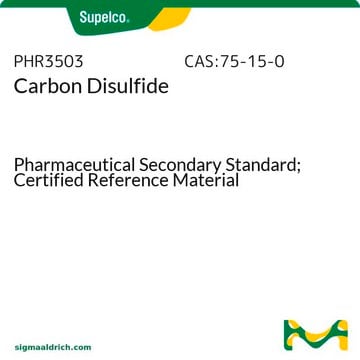40363
Carbon disulfide solution
certified reference material, 5000 μg/mL in methanol
About This Item
Recommended Products
grade
certified reference material
TraceCERT®
Agency
EPA 8240
product line
TraceCERT®
CofA
current certificate can be downloaded
packaging
ampule of 1 mL
concentration
5000 μg/mL in methanol
technique(s)
HPLC: suitable
gas chromatography (GC): suitable
application(s)
agriculture
cleaning products
cosmetics
environmental
food and beverages
personal care
format
single component solution
storage temp.
2-8°C
SMILES string
S=C=S
InChI
1S/CS2/c2-1-3
InChI key
QGJOPFRUJISHPQ-UHFFFAOYSA-N
Looking for similar products? Visit Product Comparison Guide
Application
Legal Information
related product
Signal Word
Danger
Hazard Statements
Precautionary Statements
Hazard Classifications
Acute Tox. 3 Dermal - Acute Tox. 3 Inhalation - Acute Tox. 3 Oral - Flam. Liq. 2 - STOT RE 2 - STOT SE 1
Target Organs
Eyes,Central nervous system, Peripheral nervous system,Central nervous system,Cardio-vascular system,Eyes
Storage Class Code
3 - Flammable liquids
WGK
WGK 2
Flash Point(F)
49.5 °F - Methanol
Flash Point(C)
9.7 °C - Methanol
Choose from one of the most recent versions:
Already Own This Product?
Find documentation for the products that you have recently purchased in the Document Library.
Customers Also Viewed
Protocols
Separation of various pyrazines and sulfur compounds including carbon disulfide and dimethyl disulfide.
Our team of scientists has experience in all areas of research including Life Science, Material Science, Chemical Synthesis, Chromatography, Analytical and many others.
Contact Technical Service









